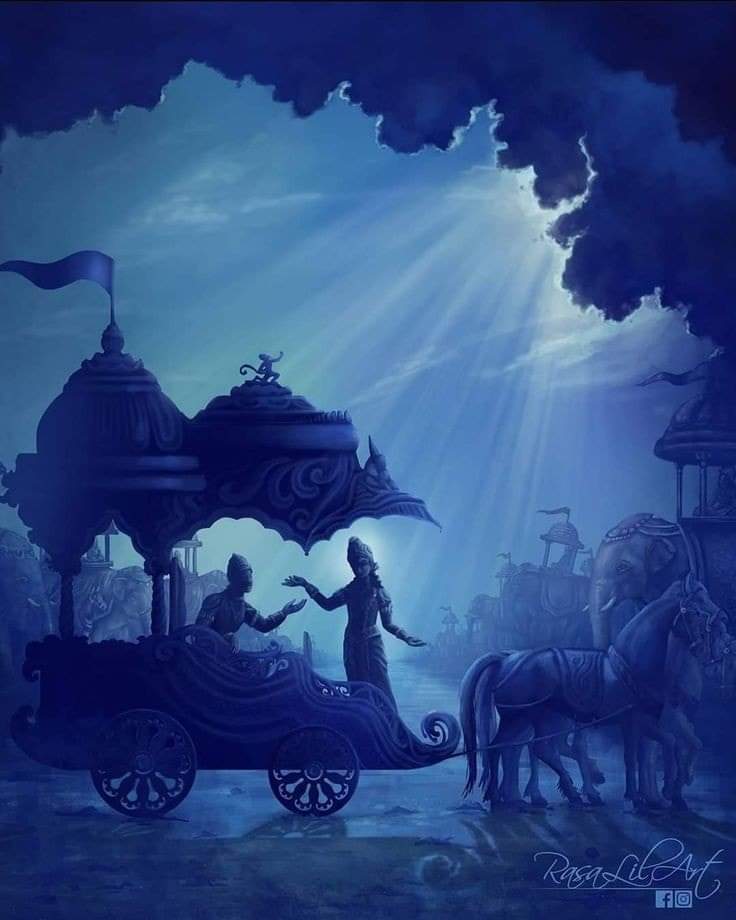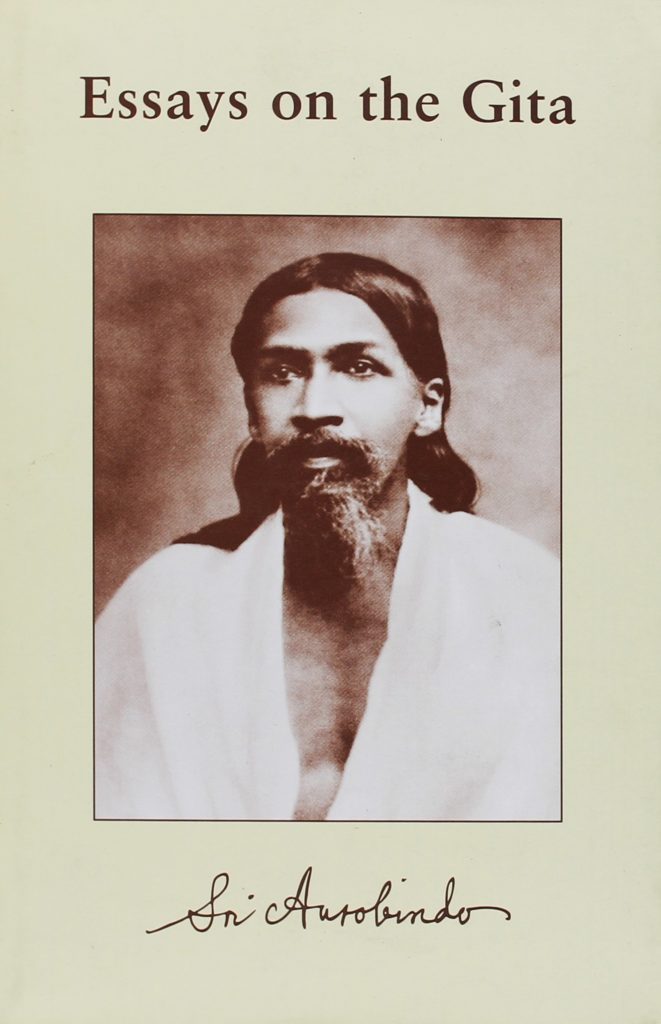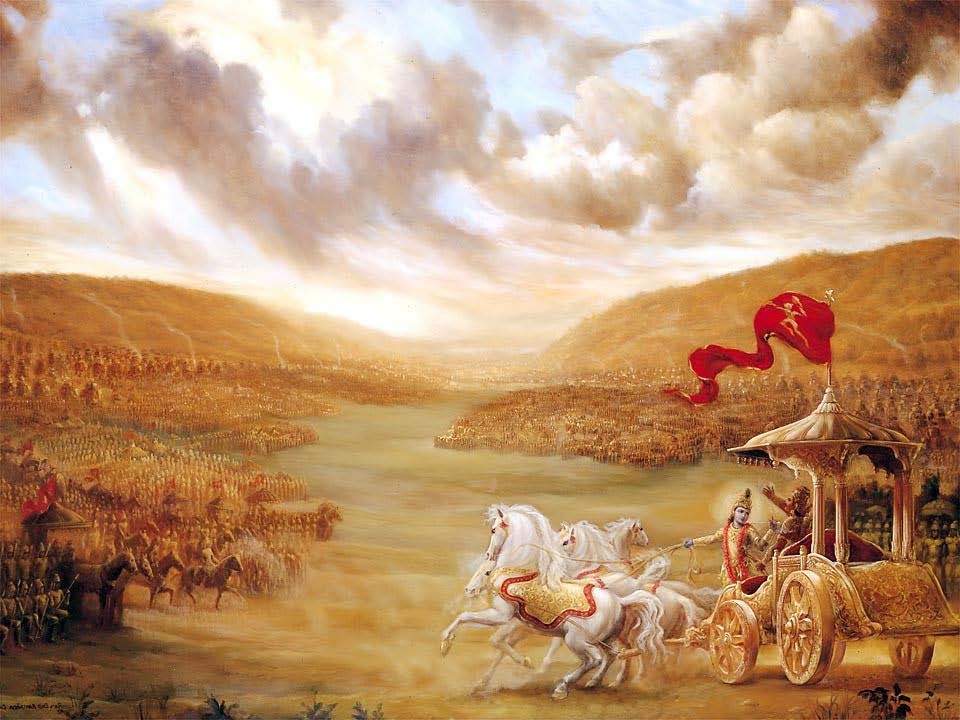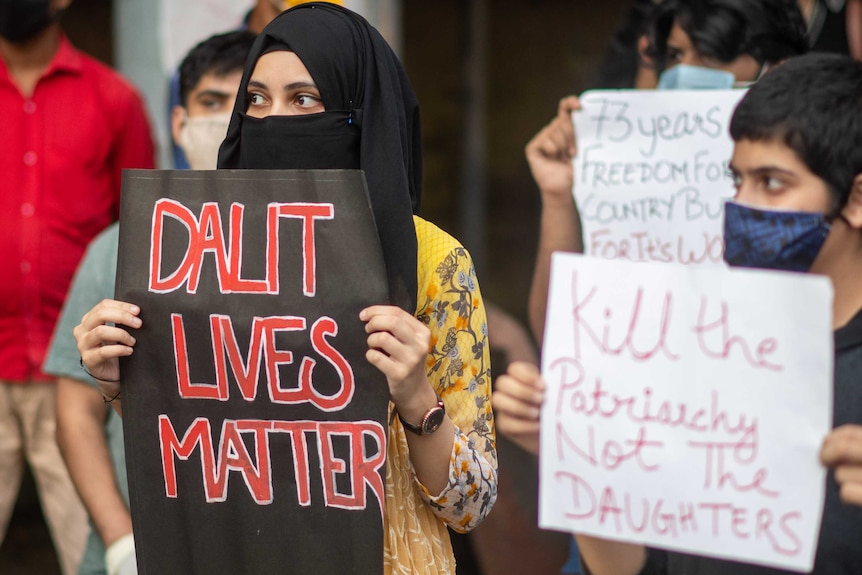- Visitor:41
- Published on:
Kuladharma and dilemma of Arjuna: Analysis under the light of Sri Aurobindo
Till the life is molded as per that spiritual teaching, established and understood in the equality, indisputable unity and calmness of soul beyond the notion of sin and virtue, a man is bound to demote if he ignores the sense of sin and virtue. Since, Arjuna was in doubt and yet to attain that state, Krishna first explained to him the importance of Swadharma or own duty aligned to individual nature and liability, as the first step towards enlightenment. Arjuna was a Kshatriya and hence it would have been an absolute sin if he gave up his war.


Arjuna argued in fear that if the families or clans are shattered, Dharma will be automatically destroyed. Then, iniquity will pervade everywhere. He understood well that if only one person from the folk is sacrificed for the welfare of the entire clan, it can be recommended. However, if everyone is killed in excessive genocide, who will rise and protect the Dharma of the lineage? With the collapse of family traditions, lawlessness would overcome the entire nation.
The elders of the family bear with them various ideals, customs, values and age-old traditions which are passed on to future generations. These traditions nurture moral values in their clans or Kulas. Each family of Kula had its own distinct standards and was following its own ideals of conduct. Further, in those times, before the prominence of individual liberty through Buddhism, individuals had to abide by their social norms and laws as prescribed to them. In Vedic India, a society was established on the clans, as the Pandavas and Kauravas belonged to the same Kuru lineage. These clans developed into vast vital energy and evolved from their own, following their distinct moral, social, ritualistic and spiritual principles, without any external or foreign influences. Further, the ancients used to follow the great ideal of politics that no conflict between these tribes takes place and full opportunity is provided to every clan in developing their own independent life. Thus, a Rajchakravarti was required who could control the harmony establishing a Dharma rajya- an ideal Indian Empire, the primary secret purpose of Kurukhsetra war!

Written about 2300 years ago, Arthashastra notes that the Dharma of the head of the family was lying in sacrificing their own pleasure for the benefit of other members. Again, we have seen elder brothers or sisters dedicating their lives to the younger ones in India till today. Further, while promoting any family business, their closest relative or family circles also come forward like helping through funds. Conducting business is also done in the Indian community under the eyes of senior members of the family. Also, elders, housewives and children take part in business tradition. Thus, a Hindu family has not only been the smallest social unit, but also the smallest economic unit of the nation. In ancient times, nobody in the family acted and thought like an individual. For business, there was nothing such as individualism in this land. Thus, a family or Kula has been contributing highly to the country’s economic function and progress.

Currently, the ideology of social, economic and political governance that we have imported from the West does not fit our lives. This is totally opposite of India’s eternal ideology that attempts to shape all problems in one way, one mold!
Though it is temporarily useful but it hampers the smooth development of a nation’s life, crushing the life from inside and contradicting a Hindu’s inherent idea of independence. Nevertheless, the life of state that emerged after the Kurukshetra war was no longer solely based on Kula. Numerous independent centers of life were created in various areas of India. However, the basic characteristics of national life were fully retained in that. Here, only diversified development occurred. Different group of people have built their lives as per their strengths, characters and needs under the framework of villages, cities, towns, communities, races and even religions. What a superb stream of life flowed in ancient India where, without any external pressure they successfully found solutions to their own problems, at the same time keeping their duties, profession, pleasures and salvation in their mind!

The monarchy was only liable to protect each other from any clash or conflict and prevent internal and external enemies. Throughout our old texts, history and theology, we find that the kings are repeatedly appointed to respect the customs and practices and maintain their dignity, always taking advice from their administrators. Also, these councils of ministers were the ones who were elected by those various clans or associations. It is the traditional national ideology of our politics. Though these independent centers of life are trodden in modern times due to foreign invasion, oppression and rule, still India is able to sustain its embedded national consciousness. We try to imitate the British parliament and we elect representatives who have come to that position through ability, power, money or any trickery and thus only gain the outward glimpse of freedom like the west. We have forgotten the way how our ancestors used to conduct their own affairs through small independent associations. Thus in every sphere of life complete freedom was there. Hence, it is needed to establish different autonomous working associations that will give the full scope to evolve everyone as per their needs, aims and Dharma.

Addressing Krishna as the descendant of the Vrishni, Arjuna continued lamenting that the purity and sacredness of women would be destroyed if he indulges in this genocide of various Kulas in front of him. This will give birth to wicked and disloyal children of hybrid clans. The education and discipline would end as a result of adultery- erasing the sanctity of Kula! Immense guilt grasped his mind as the dignity of various Kulas of Bharatvarsha now lies in his own hand. It is to be noted that keeping aside the other Varnas, for the Kshatriyas, the loyalty to their clan was lying in always being ready for battle and sacrificing their lives. Hence, the war would ruin the sense and pride of lineage and disturb their natural human tendencies for further progeny. The consequences about which Arjuna was fearing actually happened in India with time. Innumerable states and communities were created afterward leading to hybridization of clans in India.

From the historical point of view, this fear of hybridization came excessively to the mind of Vedic people. It became very difficult for the commons to go out of their working order in society. As the power of every clan was getting weakened from the inside due to blind faith and superstition, the clans were unable to carry the individuals with meaningless rituals. However, the clan leaders were never ready to break the chain. Here, we can see the arrival of God himself and the war taking place by the will of God. After, the Mahabharata war a remarkable rise in glory took place for India with a new body and life where we find how the country had attained its peak in economy, education, literature and art and power.

Arjuna was further terrified because as per scriptures the ultimate destiny of the people who would die on this platform would be hell. This is because there would be no one from their direct lineage to perform their death rites. Definitely, our ancient poets and mystics have illustrated the realm of hell amid extreme horror. However, according to Vedantic thoughts, as our actions hinder our self-evolution apart from developing our divinity as per our deeds, we fetch the downfall and degradation. This is the metaphoric “hell”. In the 21st verse of the 16th chapter, the Gita defines lust, anger and greed as the three gates of hell- the root of deterioration of soul. For example, a woman whose chastity is harmed by force does not need any atonement and no sin catches her- as opposed in many other religions. As mentioned earlier, since maintaining purity of Kula and prevention of any hybridization was strictly maintained by clan leaders, hence, as a rule, the fear of falling to hell of the respected ancestors was propagated.

Arjuna believed that due to the sin of mixing blood among leaders, the Kuladharma and Jatidharma would be annihilated and wiped out. Besides Kula, what is exactly meant by “Jati” by Arjuna cannot be assured. As per the quality and temperment of ancient times, the Varna system did not last long. Certainly, in the first place there was difficulty in judging people according to their qualities. Hence, it turned into hereditary class-division or Varna division and eventually became race division or Jatibheda. For example, the Brahmins were of high intellect and educated, but it never meant that their descendants would also inherit the same quality.

In later times, it was apt to classify and identify people as per their business and profession, since the prior categorization had no meaning and significance in society, just leaving only pointless family rituals. This was giving rise to numerous Jatis. Again, the term Jati originates from the idea of union as per birth or innate unity. People coming from the same one ancestor were regarded to be of similar Kula. As the Kula turned very wide, it got broken into several sub-Kulas. The one Kula, from where those other Kulas were created was referred to as Jati. However, from the response of Krishna in this context, it seems that the matter was of Aryan and Non-Aryan division. Whatever it may be, Arjuna was mentioning the situation and issues of his contemporary society that he has been witnessing. Though Arjuna’s statement on the issue of chaos within society and violation of social norms is very right, but with the evolution of man, change and development were also needed in social ideological sphere of India. If the traditions and so-called “eternal laws” hinder society’s evolution, is it not honest and correct that we must remind the greater and eternal truth by asking ourselves the eternal questions of what is God? what is soul? what is life? what is the meaning of life? what is society? We should understand that the actual link between every individual ultimately lies in this greater and eternal truth of oneness. Every living creature is a part of one God and God being in every living entity makes everything Bhagavatswarup or another form of the Bhagavata. To eventually evolve and ultimately attain the life of divine or Bhagavatjeevan, all the theologies, ideologies and customs are created every time. However, what is suitable and followed in one era cannot be useful in another age. Nonetheless, people forgot this truth and disrupted evolution of life holding on to some rituals that were out of place. Here is the significance of Gita’s teachings where we find God himself descending in the form of revolution, dispelling a man and his society’s inner doubt, eradicating the rubbish from the community and paving a new way towards evolution.

Further, Arjuna was scared that even the fate of the men from destroyed family cult will be fixed in hell and lamented what a crime he is going to commit by killing his own relatives in the greed for land and power. This was his biggest objection to this war.

This feeling of sin and virtue is there as a basic instinct in every human being and this cannot be ignored. Definitely, we cannot judge and determine good and bad consequences of our actions every time only through reasoning. In that case, the only way left to settle on the good and bad effects of Karma is through this sense of feeling sin and virtue. This is what is called moral sense or conscience. Here, Krishna could have easily adviced that “You have to conquer the enemy and perform your duty for your society and country by trampling all the sense of virtue and sin, conscience and weakness arising in mind”. Even Friedrich Nietzsche would have taught Arjuna this in those circumstances. Moreover, this is how Western politicians teach duty to their soldiers for fighting. However, our God does not suggest any such thing. He never asked to suppress his inner feeling or totally neglect the idea of sin and virtue. He just guided him towards the path of deep spiritual understanding and awareness where sin cannot entrap one’s Karmic outcome. Till the life is molded as per that spiritual teaching, established and understood in the equality, indisputable unity and calmness of soul beyond the notion of sin and virtue, a man is bound to demote if he ignores that sense of sin and virtue. Since, Arjuna was in doubt and yet to attain that state, Krishna first explained to him the importance of Swadharma or own duty aligned to individual nature and liability, as the first step towards enlightenment. Arjuna was a Kshatriya and hence it would have been an absolute sin if he gave up his war.
Summarized from:
Srimadbhagavatgita (as per explanation of Sri Aurobindo) by Sri Anilbaran Rai
Other references:
Indian Models of Economy, Business and Management by P.Kanagasabapathi
https://www.holy-bhagavad-gita.org/chapter/1/verse/45-46
Images:
https://shlokam.org/bhagavad-gita/1-45
https://www.shutterstock.com/image-illustration/large-diverse-group-people-seen-above-676495477
http://psychology.iresearchnet.com/social-psychology/
Center for Indic Studies is now on Telegram. For regular updates on Indic Varta, Indic Talks and Indic Courses at CIS, please subscribe to our telegram channel !
- 20 min read
- 0
- 0










